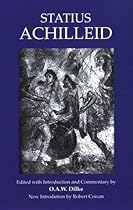Statius: Achilleid (Bristol Phoenix Press - Classic Editions)

| Author | : | |
| Rating | : | 4.39 (667 Votes) |
| Asin | : | 1904675115 |
| Format Type | : | paperback |
| Number of Pages | : | 188 Pages |
| Publish Date | : | 2016-07-02 |
| Language | : | English |
DESCRIPTION:
W. Armed with Dilke in paperback and H's excellent monograph, university teachers will now be able to consider offering the Achilleid, a manageable text of a little over 1100 lines, to their students."--Journal of Classics Teaching. presents his information."--JACT" there has also been a recent reissue in paperback of O. In a work of commendable philological knowledge, D. "This slim volume contains far more than its size suggests; the Latin text of Statius' Achilleid, an introduction and a learned commentary by D., and an additional introduction and bibliogra
Dilke. These themes are explored in a new introduction by Robert Cowan, which surveys the latest research on the poem. The poem tells how the sea-nymph Thetis, in a vain attempt to save her son from his destined end in the Trojan war, hid him on the island of Scyros, disguised as a girl. The combination of these two distinct approaches will assist undergraduates and postgraduates in reading the text, and, at the same time, it will provide a valuable resource for the more advanced scholar.. Its project - to tell the whole life of Achilles - was cut short by the poet's untimely death. Its assessment, very much in the modern critical manner, contrasts with and complements the traditional textual and philological commentary by O.A.W. His feminine disguise was eventually penetrated by Ulysses and Diomedes, who tricked him into exposure of his truly warlike aspirations. Statius' Achilleid is perhaps the most remarkable of all Latin epic poems. Yet the completed first book and the earliest part of the second have a charm and freshness matched only in some of Ovid's most lively and engaging work. There he fell in love with the beautiful Deidamia, but at the same time, with the idea of glory in war. In relating this story Statius explores the nature of gender and the limits of the epic genre, while playfully and wittily positioning himself in the epic - and wider - poetic tradit
. O.A.W. Dilke was Lecturer in Humanities at the University of Glasgow, and is currently Professor of Latin in the University of Leeds.Robert Cowan has held lecturing posts in the Universities of Bristol, Exeter and Oxford
